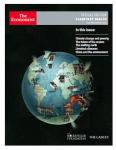The degradation of ecological systems and natural resources combined with unsustainable consumption and production are jeopardizing the health and well-being of future generations, according to a Rockefeller Foundation-Lancet Commission on Planetary Health report.
The report establishes clear linkages between human health and changing environmental conditions, such as increased carbon dioxide (CO2) emissions, ocean acidification and increased fertilizer use in agriculture, particularly in Africa.
 October 2015: The degradation of ecological systems and natural resources combined with unsustainable consumption and production are jeopardizing the health and well-being of future generations, according to a Rockefeller Foundation-Lancet Commission on Planetary Health report. The report establishes clear linkages between human health and changing environmental conditions, such as increased carbon dioxide (CO2) emissions, ocean acidification and increased fertilizer use in agriculture, particularly in Africa.
October 2015: The degradation of ecological systems and natural resources combined with unsustainable consumption and production are jeopardizing the health and well-being of future generations, according to a Rockefeller Foundation-Lancet Commission on Planetary Health report. The report establishes clear linkages between human health and changing environmental conditions, such as increased carbon dioxide (CO2) emissions, ocean acidification and increased fertilizer use in agriculture, particularly in Africa.
The Rockefeller Foundation and the Lancet Commission launched the report, titled ‘Safeguarding Human Health in the Anthropocene Epoch,’ at UN Environment Programme (UNEP) headquarters in Nairobi, Kenya.
According to the report, the degradation of the planet’s air, land and water has contributed to biodiversity loss and resulted in changing disease patterns and the emergence of new diseases. The report address the effect of environmental changes, such as climate change, freshwater shortages and extreme weather events on human health.
“Environmental degradation poses serious threats to human health,” cautioned UNEP Executive Director Achim Steiner, noting that such exploitation compromises the health of the planet and of future generations. He called for “a sustainable approach to economic development and consumption and production” to promote a healthier planet and population.
In Africa, increasing environmental degradation will contribute to further economic and social inequities and health challenges, according to the report. It explains that poverty increases risks to environmental change and exposure to disasters and pollutants, and recommends addressing urbanization challenges.
The report also recommends global and national reforms of subsidies and taxes in the agriculture, energy, fisheries, health and water sectors, including the incorporation of protection of human and planetary health in budgeting and financing discussions. The report suggests that the East Africa region could engage in discussions on shared priorities and actions to combat the effects of planetary degradation and environmental health challenges, such as through reviewing resource use policies.
The Rockefeller Foundation and The Lancet formed the Commission on Planetary Health in 2014 to review the scientific basis for linking human health to the integrity of the planetary system. The report is also being launched at a series of events around the world, including in Australia, Chile, China, Malaysia, Pakistan and South Africa. [UNEP Press Release] [Publication: Safeguarding Human Health in the Anthropocene Epoch]